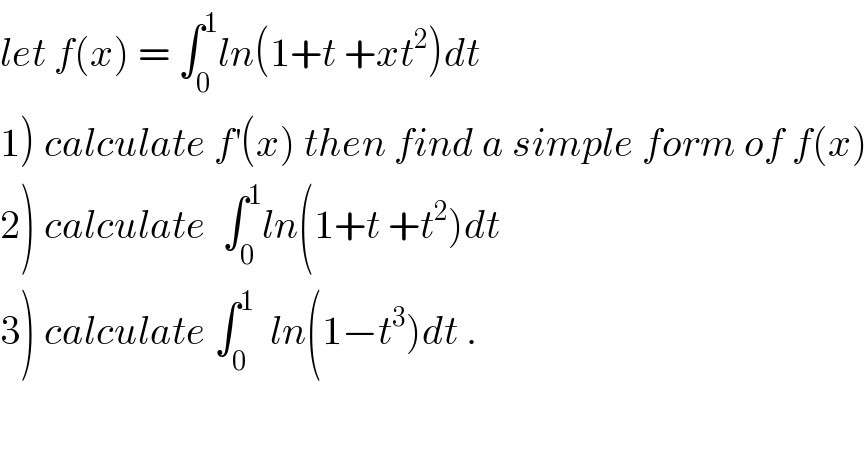Question Number 41679 by math khazana by abdo last updated on 11/Aug/18

Commented by maxmathsup by imad last updated on 11/Aug/18
![1) we have f^′ (x) = ∫_0 ^1 (t^2 /(xt^2 +t+1))dt =(1/x) ∫_0 ^1 ((xt^2 +t+1−t−1)/(xt^2 +t+1))dt =(1/x) −(1/x) ∫_0 ^1 ((t+1)/(xt^2 +t +1))dt let decompose F(t) =((t+1)/(xt^2 +t +1)) Δ =1−4x case 1 1−4x>0 ⇔ x<(1/4) ⇒t_1 =((−1+(√(1−4x)))/(2x)) and t_2 =((−1−(√(1−4x)))/(2x)) F(t)=((t+1)/(x(t−t_1 )(t−t_2 ))) = (a/(t−t_1 )) +(b/(t−t_2 )) a=((t_1 +1)/(x ((2(√(1−4x)))/(2x)))) = ((t_1 +1)/( (√(1−4x)))) b = ((t_2 +1)/(x(−((2(√(1−4x)))/(2x))))) =−((t_2 +1)/( (√(1−4x)))) ⇒ ∫_0 ^1 F(t)dt = ∫_0 ^1 {(a/(t−t_1 )) +(b/(t−t_2 ))}dt =[ aln∣t−t_1 ∣ +b ln∣t−t_2 ∣]_0 ^1 = aln∣1−t_1 ∣+bln∣1−t_2 ∣−aln∣t_1 ∣−bln∣t_2 ∣ =aln∣((1−t_1 )/t_1 )∣ +bln∣((1−t_2 )/t_2 )∣ ⇒ f^′ (x)=(1/x) −(1/x){aln∣((1−t_1 )/t_1 )∣+bln∣((1−t_2 )/t_2 )∣} ⇒ f(x)=(1−λ_0 )ln∣x∣ +c with λ_0 =aln∣((1−t_1 )/t_1 )∣+bln∣((1−t_2 )/t_2 )∣(known) c=f(1) ⇒ f(x)=(1−λ_0 )ln∣x∣ +f(1)](https://www.tinkutara.com/question/Q41692.png)
Commented by maxmathsup by imad last updated on 11/Aug/18
![case 2 1−4x<0 ⇒no real roots if x>(1/4) ∫_0 ^1 F(x)dx = ∫_0 ^1 ((t+1)/(xt^2 +t +1)) dt =(1/(2x)) ∫_0 ^1 ((2xt +1 +2x −1)/(xt^2 +t +1)) dt =(1/(2x))[ln∣xt^2 +t+1∣]_0 ^1 +(1/(2x)) ∫_0 ^1 ((2x−1)/(xt^2 +t +1))dt =(1/(2x))ln∣ x+2∣ +((2x−1)/(2x^2 )) ∫_0 ^1 (dt/(t^2 +(t/x) +(1/x))) but ∫_0 ^1 (dt/(t^2 +(t/x)+(1/x))) = ∫_0 ^1 (dt/(t^2 +2(t/(2x)) + (1/(4x^2 )) +(1/x)−(1/(4x^2 )))) =∫_0 ^1 (dt/((t+(1/(2x)))^2 +((4x−1)/(4x^2 )))) =_(t+(1/(2x))= ((√(4x−1))/(2x))u) ∫_(1/( (√(4x−1)))) ^((2x+1)/( (√(4x−1)))) (1/(((4x−1)/(4x^2 ))(1+u^2 ))) ((√(4x−1))/(2x)) du =((4x^2 )/(4x−1)) .((√(4x−1))/(2x)) { arctan(((2x+1)/( (√(4x−1)))))−arctan((1/( (√(4x−1)))))} = ((2x)/( (√(4x−1)))) { arctan(((2x+1)/( (√(4x−1)))))−arctan((1/( (√(4x−1)))))}⇒ f^′ (x) = (1/x) −(2/( (√(4x−1)))){ arctan(((2x+1)/( (√(4x−1)))))−arctan((1/( (√(4x−1)))))} ⇒](https://www.tinkutara.com/question/Q41693.png)
Commented by maxmathsup by imad last updated on 11/Aug/18

Commented by maxmathsup by imad last updated on 11/Aug/18
![2) by parts ∫_0 ^1 ln(t^2 +t+1)dt =[tln(t^2 +t+1)]_0 ^1 −∫_0 ^1 t ((2t+1)/(t^2 +t+1))dt =ln(3) −∫_0 ^1 ((2t^2 +t)/(t^2 +t +1)) dt but ∫_0 ^1 ((2t^2 +t)/(t^2 +t +1)) dt = ∫_0 ^1 ((2(t^2 +t+1) +t−2t−2)/(t^2 +t+1)) dt=2 −∫_0 ^1 ((t+2)/(t^2 +t +1))dt =2−(1/2) ∫_0 ^1 ((2t+1+3)/(t^2 +t +1)) dt =2−(1/2)[ln∣t^2 +t+1∣_0 ^1 −(3/2) ∫_0 ^1 (dt/(t^2 +t+1)) =2−(1/2)ln(3) −(3/2) ∫_0 ^1 (dt/((t+(1/2))^2 +(3/4))) =_(t+(1/2)=((√3)/2)u) 2−((ln(3))/2) −(3/2) (4/3) ∫_(1/( (√3))) ^(√3) (1/(1+u^2 )) ((√3)/2)du =2−((ln(3))/2) −(√3)[arctanu]_(1/( (√3))) ^(√3) =2−((ln(3))/2) −(√3){ (π/3) −(π/6)} =2−((ln(3))/2) −(π/6)(√3) ⇒ ∫_0 ^1 ln(1+t +t^2 )dt =ln(3) −2 +((ln(3))/2) +((π(√3))/6) =(3/2)ln(3) +((π(√3))/6) −2 .](https://www.tinkutara.com/question/Q41697.png)
Commented by maxmathsup by imad last updated on 11/Aug/18
![3) ∫_0 ^1 ln(1−t^3 )dt =∫_0 ^1 ln(1−t) dt +∫_0 ^1 ln(1+t+t^2 )dtbut ∫_0 ^1 ln(1−t)dt =_(1−t=x) ∫_0 ^1 ln(x)dx =[xln(x)−x]_0 ^1 =−1 ⇒ ∫_0 ^1 ln(1−x^3 )dx =−1 +(3/2)ln(3)+((π(√3))/6) −2 =−3 +(3/2)ln(3) +((π(√3))/6) .](https://www.tinkutara.com/question/Q41698.png)
Answered by alex041103 last updated on 11/Aug/18
![1+t+xt^2 =x(t−t_1 )(t−t_2 ) t_(1,2) =((−1±(√(1−4x)))/(2x)) ⇒f(x)=∫_0 ^1 ln(x)dt+∫_0 ^1 ln(t−t_1 )dt +∫_0 ^1 ln(t−t_2 )dt As we know ∫ln(x)dx=x(ln(x)−1) ⇒f(x)=ln(x)+ln(1−t_1 ) +ln(1−t_2 )−2= =ln(x(1−t_1 )(1−t_2 ))−2= =ln(2+x)−2 ⇒f(x)=ln(2+x)−2 ⇒∫_0 ^1 ln(1+t +t^2 )dt=f(x=1)=ln(3)−2 ⇒∫_0 ^1 ln(1−t^3 )dt 1−t^3 =(1−t)(1+t+t^2 ) ⇒∫_0 ^1 ln(1−t^3 )dt=∫_0 ^1 ln(1−t)dt+f(1)= =[(1−t)(ln(1−t)−1)]_1 ^0 +f(1)= =[−1−lim_(t→1^− ) ((ln(1−t)−1)/(1/(1−t)))]+f(1)= =−[1+lim_(t→1^− ) ((−(1/(1−t)))/(1/((1−t)^2 )))]+f(1)= =−1+ln(3)−2 ⇒∫_0 ^1 ln(1−t^3 )dt=ln(3)−3](https://www.tinkutara.com/question/Q41680.png)
